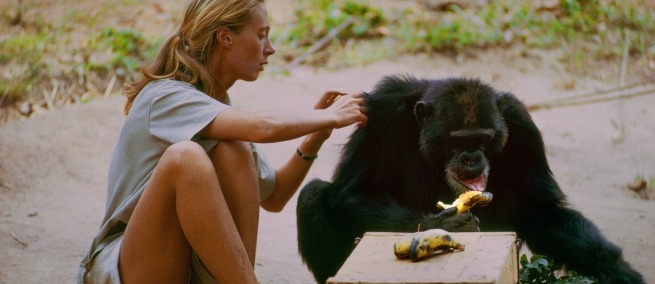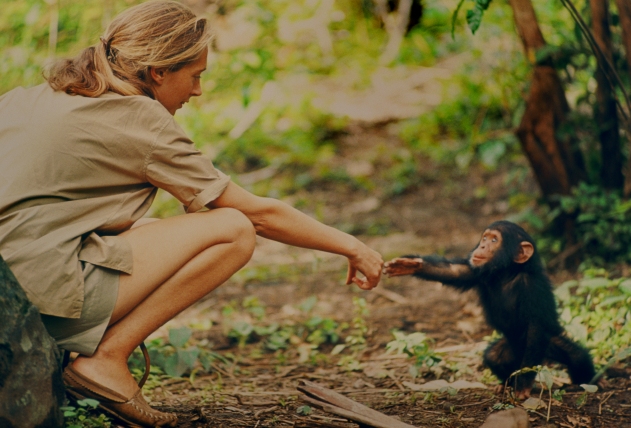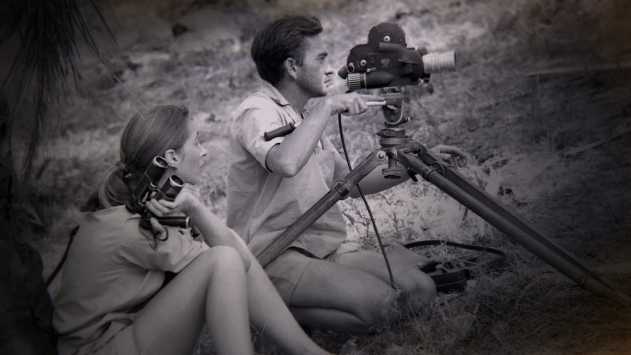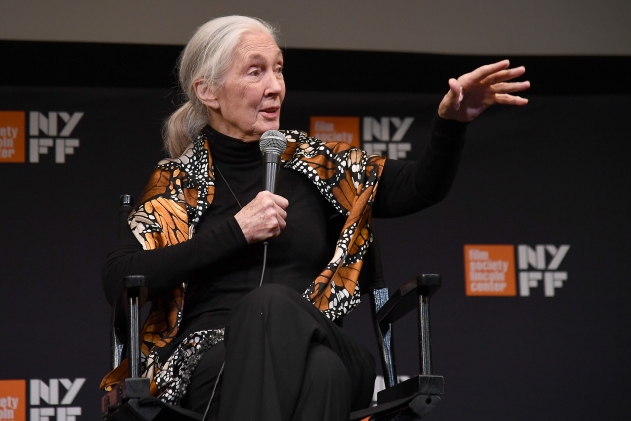
She was the first human to observe chimpanzees closely in the wild for scientific purposes. Her observations redefined what makes humans unique; they led to a greater understanding of homo sapiens’ ancestors. The story of Jane Goodall transcends the woman herself. Brett Morgen’s new documentary, JANE, is centered on the period from Dr. Goodall’s life and work in Africa of first encounters and establishment of long-term study. She was getting to know chimpanzees–she said, at a screening in September, that these were “the best days of my entire life.”
JANE is composed of footage–which Morgen clearly color-corrected, to the film’s detriment–from the 1960s shot on 16mm with a Bolex camera by Dr. Goodall’s then-husband Hugo van Lawick. Goodall was in Tanzania at the Gombe Stream National Park studying chimpanzee behavior with funding in part from the National Geographic Society, even though at the time she had no formal education. Lawick was on assignment from National Geographic to shoot Goodall’s work with chimpanzees in order to help with research funding. After a preview screening of JANE that Science & Film attended in New York on September 25, Dr. Goodall remarked on how JANE is “so pure to how I was back then.”

“I was being at one with nature and overcoming this barrier between us and another species, finding all these amazing minds and personalities that science then told me subsequently didn’t exist.” Jane Goodall conducted her first scientific study in collaboration with paleoanthropologist Louis Leakey who was interested in human evolution. (Mary, Leakey’s wife, was a paleoanthropologist as well and together they demonstrated that humans evolved in Africa. Mary Leakey uncovered hominid footprints in Tanzania which are the oldest known footprints of bipedal humans.) After two years at Gombe, Dr. Goodall became accepted by the chimpanzee community such that she was able to feed the male chimp she named David Greybeard bananas and play with the infant Flint.
When Dr. Goodall enrolled in Cambridge University for a Ph.D. in ethology, she was told “you’ve done everything wrong. You should have given the chimpanzees numbers not names.” Speaking about animals’ personalities, minds, or emotions was anthropomorphizing them, her professors at Cambridge told her. “Fortunately,” Dr. Goodall said at the screening, “I had this teacher when I was a child who was my dog. Because you can’t share your life with a dog, or a cat, or a rat and not know that of course animals have personalities, minds, and feelings.”

In JANE, Dr. Goodall talks about how Dr. Doolittle and Tarzan inspired her love of animals and desire to live with them in Africa. At the screening, Science & Film asked about what other books inspired her. “We didn’t have any money [growing up] so it was books from the library or second-hand bookshops where I found a lot of early traveller tales about Africa.” There was one book in particular that her mother, who later served as her chaperone in Africa, saved up to buy with coupons. “It was called The Miracle of Life and it was not for children. I was only about 11, and I just spent hours and hours and hours reading,” Dr. Goodall said. “It went through the diversification of species, it went through medical history, it went through evolution. That book has been reissued. You can still get it.”
To make JANE, Brett Morgen went through 140 hours of archival footage taken by Hugo van Lawick who “wasn’t allowed a film crew because it would spook the animals, so he had carry all the equipment by himself,” Morgen said in awe at the screening. “The equipment weighed a ton. And if you went to set up a shot and the chimps came the other direction there was nothing for that day. Not to mention changing magazines [that hold the film in the camera] in the middle of a jungle.”

JANE is set to an original score by Philip Glass. It is produced by National Geographic Documentary Films, and will be released into select theaters by Abramorama on October 20 after its U.S. premiere at the 55th New York Film Festival on October 5.